Only.... I ignored my own suggestion, got home at 8, realized I probably should have planned better by sticking chicken breasts in the fridge to thaw a bit the night before, and finally sat down for dinner at 9:45. It's not a big deal for me to eat so late, but I was a little impatient and didn't cook the chicken quite long enough (I ended up just cutting off the too-pink side, losing two, maybe three bites, and I stuck the leftovers back in the oven for a bit longer).
Anyway, dinner.
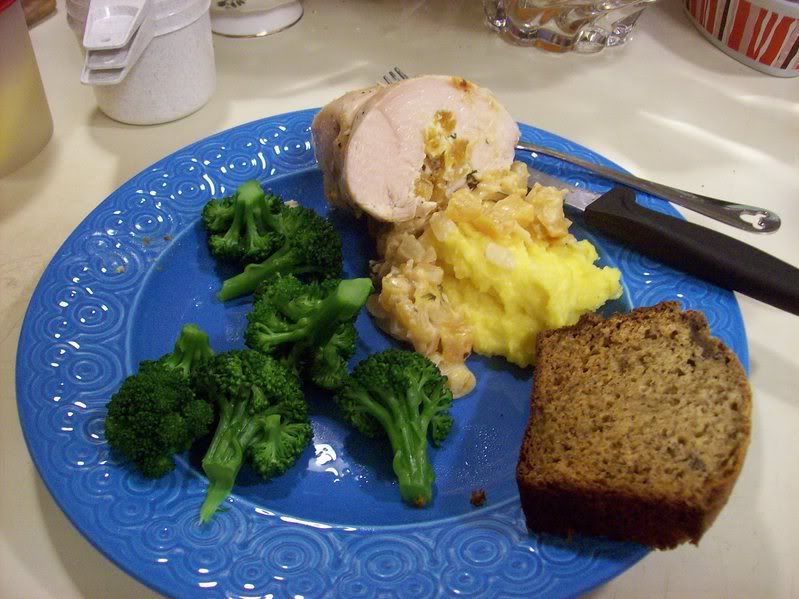
Looks yummy, right?
Here's what I did.
I thawed a whole chicken breast I just happened to have in the freezer (I love the freezer, it's a treasure trove of meats and breads). This is enough meat to last me four meals.
Meanwhile, I made a stuffing mix of about 4oz (2/3 of a standard 6oz package) chevre, a cup of chopped apricots, and some tarragon I found while digging around in the fridge (loosely inspired by memories of this recipe.) Then I cut a slit in each breast, stuffed in the stuffing (the stuff in the small bowl was divided between the two breasts, it was maybe 2/3 of the total mixture that I made- I saved the rest for the "sauce"), tied it up, and rubbed the outside with salt and pepper.
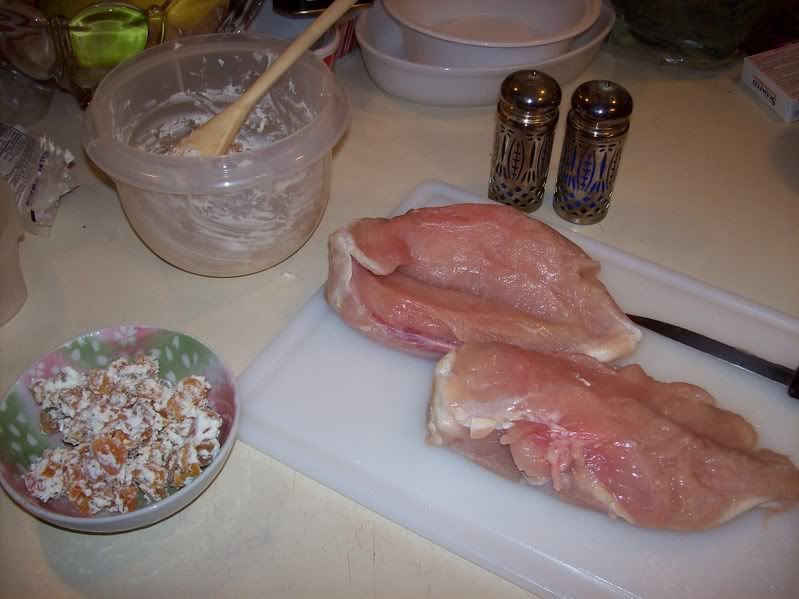
Into the pan it went, to brown on all sides- this seals in the moisture when you bake it.
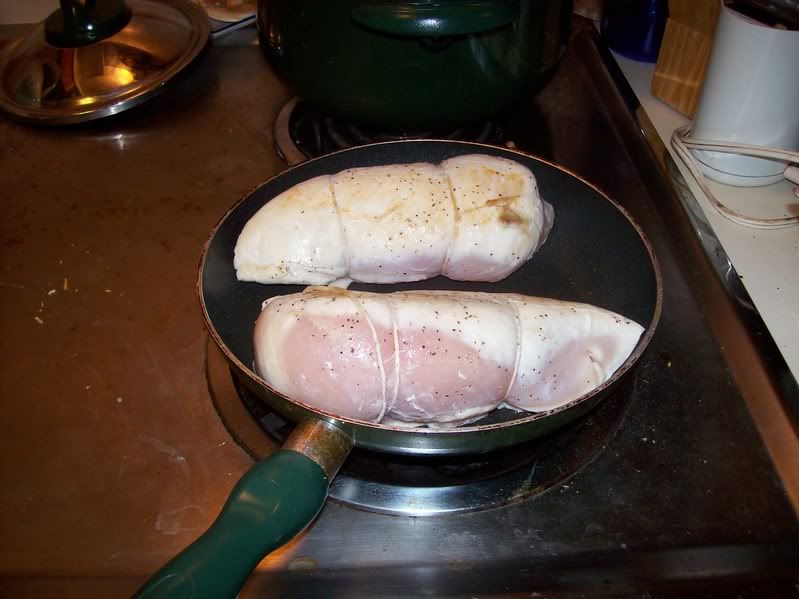
Then I baked it. I thought 350 for half an hour would be sufficient, but it was not. I took it out when it seemed to not look raw when cutting into it. However, I was wrong, but I should have probably also pounded the breasts before stuffing- they were quite thick.
While all the baking was going on
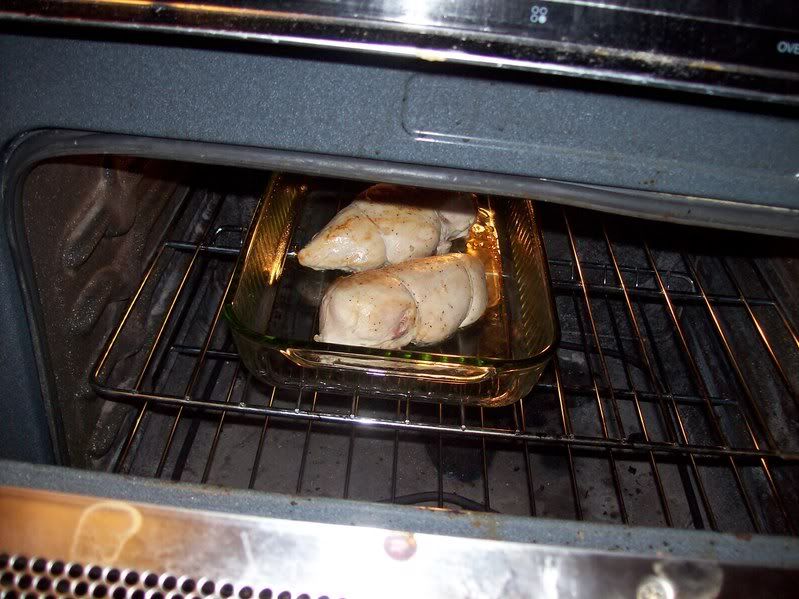 ...
...I made the sauce.
This is where things get a little... weird. I am more of a baker than a cook. It's often said that "baking is an exact science", and, being an actual scientist, I'd have to say, yeah, not so much- there is some wiggle room. When I bake, I know the limits to the wiggling, and I go to them, but not past them. I follow the recipe, I get tasty foods. On the other hand, when I cook, I tend to cook a little too freely. I start adding in random things because they taste good, don't pay attention to timing very much, and I end up with weird things that get dried out because they were ready too soon but I left it on the burner anyway, or with flavors that just don't work. I guess baking provides the borders I need, and I kind of lose it with cooking.
Plus, I find meat a little scary. And it's icky to touch when it's raw (I'm sorry, but it's true and you know it).
Anyways, back to the sauce. I like goat cheese. I like apricots. Hey, they're in the chicken! Why can't I saute up some chopped onion (I like sauteed onion, too!), add chevre and apricots, some "cream" (whole milk), deglaze the chicken frying pan with some chardonnay (it's in the fridge) and make a nice creamy sauce? And put it over polenta? Well, I'm not entirely sure why, but apparently the answer is, no, you can't.
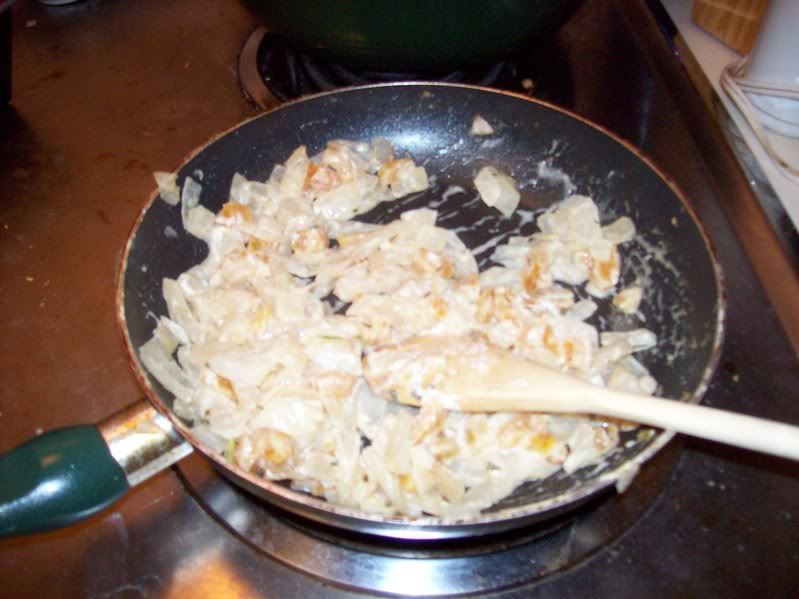
The sauce was not creamy, it was not saucy. It was more of a side than a sauce. However, since there was a ton of goat cheese (and apricots) in it, it tasted good.
I think part of the problem may have been the order in which I did everything, as well as cooking it too long. I tried to use the same idea for the sauce for the pork chops I mentioned yesterday, but I couldn't remember exactly what to do.
This often happens to me when cooking.
Finally, I made polenta. The sauce was supposed to go over the polenta, flavoring the lovely, creamy polenta with creamy sauce flavors. It didn't. The polenta also wasn't very creamy (my ratios were completely off. Martha Stewart said to use 4 cups of liquid to 1/2 a cup of polenta (i.e. cornmeal- I prefer Quaker brand, other brands I've used come out very pale and gummy, I don't quite know why) and I thought, Martha, that's insane. I'll do 1 cup of boiling water for 1/2 cup of polenta. I should know to trust Martha (although I think 2 cups of liquid for 1/2 cup of polenta would have been sufficient)- I did not make "creamy" polenta, I made the kind you'd later bake and slice to toast).
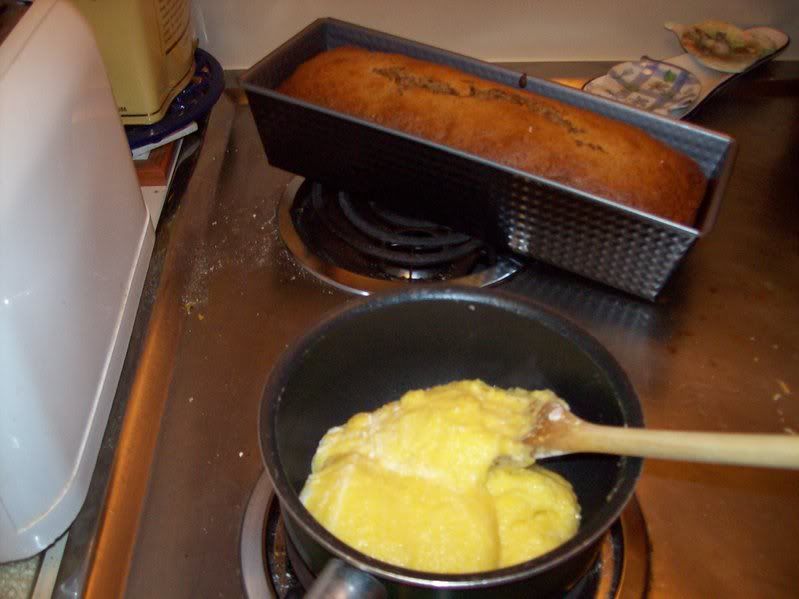
You'll notice a white streak- more chevre. :) I think I went a bit overboard with the chevre last night, and normal people probably wouldn't really like it- chevre's up there with my top favorite foods, and I think not so common.
Just so you don't think I was a total bomb in the kitchen last night, take a look at the above photo, at the item in back. Banana bread! I have been contemplating altering Aunt Blanche's banana bread recipe, which is almost a staple in my immediate family. It has great flavor, and is incredibly useful for getting rid of overripe bananas (overripe bananas work best in this recipe; don't bother if they're still greenish at all), but the main drawback, for me, is that the bread is incredibly greasy. I eat it with a fork because I actually hate to touch it.
Another old family recipe is my great-grandmother's maraschino cherry bread, which pops up only at Christmas time, and not for years and years until I decided to resurrect it in December. It uses no butter, has three eggs in a recipe that fills one loaf pan, and has a more spongey texture- not greasy at all. My great-grandmother grew up on a farm, and apparently, on farms back in the day, even though one might assume they had eggs galore, many recipes had either eggs or butter- not both. (Side note- we have a molasses cookie recipe that's been in our family since the late 1600s, and that has no eggs.) So anyway, I wondered if I could tailor the banana bread recipe to get rid of the butter, and compensate with extra eggs.
It works!
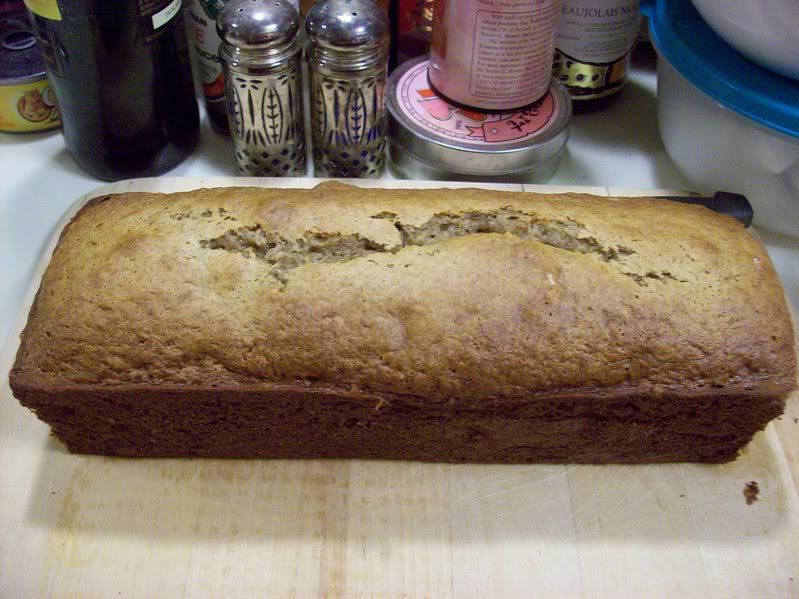
I still want to fuss around with the recipe, though. it's nice and spongey, not greasy at all, but a little tough- I want to consider changing the leavening used. Right now I have equal parts baking soda and baking powder, and I know if you overbeat anything with baking powder, it'll become tough. However, I also know that if you use baking soda, you need something acidic to interact with it and generate gas. I'm not sure what's really acidic when it comes to food (aside from the obvious citrus and vinegar).
Another thing I'll do is further reduce the sugar (I cut it down by 1/3 last night, it's just normally quite sweet) and make a glaze of some sort, both to sweeten and to rehydrate. I'll share the final recipe, once I have it.
Next up:
White Beer cookies.
No comments:
Post a Comment